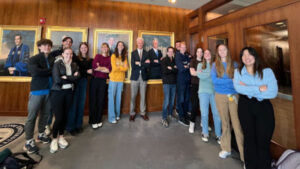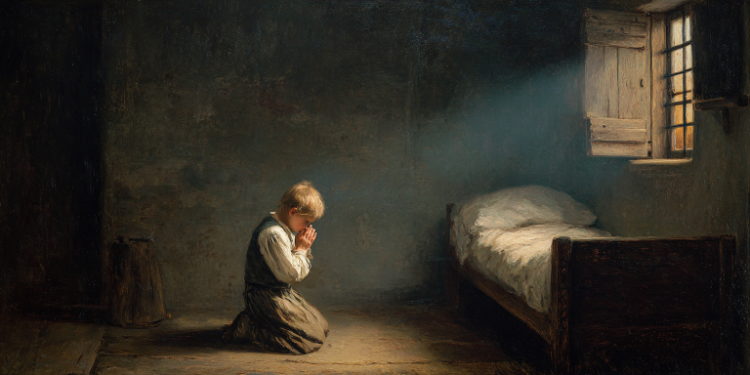A recent article in the Salt Lake Tribune tells of “dark days” at BYU. BYU has recently taken additional steps to ensure that professors who teach there believe in and support the doctrine of the sponsoring church. Think of it: a church-owned school whose mission statement states that “All students at BYU should be taught the truths of the gospel of Jesus Christ” and whose current president recently said, “Everything we do at the university starts and ends with the gospel of Jesus Christ,” wants its teachers to support the church which pays their salaries. Who would have guessed?
I can tell you who won’t be surprised: incoming freshmen who are enrolled in BYU’s new required UNIV 101 class. This class, like the changes to hiring and employment, is intended to help BYU become the “Christ-centered, prophetically directed university of prophecy” that it can be. While some would have BYU deemphasize its distinctiveness, recent changes at BYU reflect a desire to give students a more robust and authentic Latter-day Saint experience, one that integrates their faith with their academic studies.
Other changes at BYU are worth investigating and highlighting (see here for a useful summary), but I believe UNIV 101 is a useful indication of where the university is headed—and why many students are choosing BYU. By leaning into its distinctive heritage and beliefs, BYU seeks to create a meaningful alternative to the education offered at other universities. Rather than constraining students and faculty, the changes at BYU give people a choice they wouldn’t otherwise have: the choice to study in an environment that is unabashedly committed to the gospel of Jesus Christ.
UNIV 101
But what is UNIV 101, and why is BYU now requiring it? This course responds to challenges that many students face when beginning their university studies: moving away from home, adjusting to a new environment, meeting new people, and adapting to the rigors of academic life. Additionally, a key goal of this carefully cultivated model at BYU is to help students integrate their faith and academic lives, learning how to face the challenges of the world with the peace and perspective that come from living the principles of the gospel. The choice to study in an environment that is unabashedly committed to the gospel of Jesus Christ.
New students no longer participate only in large general education lecture halls but are part of a smaller, more intimate group that fosters collaboration and connection. One professor emphasized that this community-driven approach helps students feel a sense of belonging. They also feel safer and are more willing to ask questions and share experiences. “It’s essential that students not only excel academically but also feel like they belong and that their voices matter,” he said.
A key challenge in integrating spiritual values into a secular academic environment is finding ways to make faith a meaningful part of the academic experience. Part of the opportunity for all BYU faculty is to recognize that spiritual principles are not compartmentalized but woven into the fabric of every discussion, assignment, and group project. As this becomes familiar to the students through this course, they will hopefully look for it and even inspire it as they progress through other courses on campus. As one professor shared, “Our goal is not just to teach them facts but to help them see how their education can prepare them for both temporal and eternal challenges. When students understand that their academic pursuits are part of their eternal journey, they are more likely to engage with the material in a meaningful way.”
Building Community through Faculty Collaboration
A striking feature of the Learning Communities program is the collaboration required of faculty members from different departments who are involved in teaching the same cohort of students. This is no small feat. To make this work, schedules must be coordinated across departments, and instructors must be trained to teach in a way that aligns with the university’s values. Even professors who have never taught undergraduates, such as law professors who typically teach graduate students, are being called upon to teach these classes with a new approach that encourages participation, openness, and vulnerability.
The result is a classroom environment that feels more personal, more intimate, and more aligned with the gospel principles that BYU holds dear. This process can be challenging, as many of these 18-year-old freshmen are entering a new world of ideas and perspectives for the first time. Some have expressed how difficult it can be to find the courage to speak up in class, but through small group discussions and peer feedback, students gradually warm up to the environment. For this model of learning to succeed, faculty must also be prepared and committed to the vision of the university. Part of the opportunity for all BYU faculty is to recognize that spiritual principles are not compartmentalized.
Thoughtful faculty development does more than ensure effective teaching; it also nurtures the growth of professors as individuals. Many instructors find that teaching in this kind of setting challenges them to reflect on their own faith and teaching practices as well. As one professor shared, “Teaching here has been transformative for me. I’ve had to think deeply about how I teach and how my faith informs my role as an educator. It’s been a humbling and rewarding experience.”
What Makes This Experience Unique?
This initiative began with a fundamental question: what should incoming BYU students know from the outset of their BYU experience? Faculty and administrators, including the leadership of the university at the time, such as then-President Kevin J. Worthen, Academic Vice-President President C. Shane Reese, and AcademicVice-President of Undergraduate Studies Richard Osguthorpe began brainstorming what would make a BYU education truly unique. The first iteration enrolled about 60 students and was launched two years ago. These early pilots were carefully planned to determine what worked best. After testing and refining it down to a more manageable group size of 24, the program was ready for broader implementation. As of the Winter semester 2024, the Learning Communities initiative launched on a grand scale, enrolling over 1,800 incoming students—a milestone that would have seemed impossible just a few years ago.

Today the program is designed to address several needs simultaneously: academic rigor, community building, and spiritual growth. Students are placed in courses that span multiple disciplines—everything from sociology to Book of Mormon studies—and those students take these core classes together as part of their Learning Community. By grouping these courses together, students are able to collaborate on their experiences across different subjects, draw connections, and share insights in a more personal way.
Evaluation of Outcomes
One of the major questions on everyone’s mind is how its success will be measured. How will long-term impacts, like retention rates or spiritual and academic growth, be assessed?
For BYU, success will be defined not just by academic performance or graduation rates but by the overall impact it has on the students as they move through their college years. Are they more spiritually attuned? Do they view their academic pursuits through the lens of faith and discipleship? More importantly, how will they apply the lessons learned in these small, supportive communities to their future careers, families, and lives? Will they carry forward the lessons of unity, collaboration, and spiritual reflection into their later years? This is a question that won’t have an answer for a while, but the excitement around this program points to the potential for lasting impact.
While the students I spent time with spoke highly of the class and its impact, they also shared constructive ideas for improvement. While the class did a great job of merging faith and scholarship in some respects, students expressed a desire for further clarity on how to bridge these two aspects in practical, everyday contexts. For example, as one student remarked, “I loved how we connected spiritual principles with career goals, but sometimes I felt like the connection could have been clearer, more grounded in what we’re learning academically.” This suggests that while the framework is present, students may benefit from more explicit examples or guidance on how to consistently weave spiritual values into both their studies and future careers.
Another area for improvement pointed out by students was although they appreciated the sense of belonging and the integration of faith, some felt that a more structured approach to exploring complex spiritual issues would enhance the learning experience. For instance, one shared, “Sometimes I felt like we could have gone deeper into the doctrine behind what we’re discussing, especially when we talked about ethics or leadership. A more focused discussion on how our faith relates to those topics would have been helpful.” This generation seeks safe havens amidst challenging cultural landscapes.
Preparing for the Second Coming, Together
In the October 2024 LDS General Conference, President Russell M. Nelson said, “Now is the time for you and for me to prepare for the Second Coming of our Lord and Savior, Jesus the Christ.” This caught my attention, and I’ve reflected on it many times. How are we, as individuals and as a community, preparing for the second coming of Jesus Christ?
I was reminded of President Nelson’s words again as I sat as a visitor with eager freshmen in a section of UNIV 101. President Nelson’s message felt especially relevant as I observed members of the rising generation engaging with not just academic content but with their faith and peers in ways that are seemingly unique to this campus. I could see how this learning community—a space where academic rigor meets spiritual growth—was not only preparing them for future careers but for eternal purposes.
One student shared a powerful insight about how the class helped her reconcile her professional aspirations with her spiritual values. She explained, “This class really helped me see that my future career isn’t just about personal success, but it’s about using my talents to make a positive difference in others’ lives. It’s about aligning my professional goals with my spiritual values, and that connection has given me a deeper sense of purpose.”
UNIV 101 shows how the light of the gospel can inform academic life and provide a distinctive approach to higher education. Many students and faculty choose BYU precisely because it allows them the ability to pursue sacred and secular studies simultaneously. The Doctrine and Covenants teaches that “he that receiveth light, and continueth in God, receiveth more light; and that light groweth brighter and brighter until the perfect day” (D&C 50:24). Rather than “dark days” at BYU, recent changes portend a brighter future for LDS students and faculty who want an authentically LDS university experience.

















